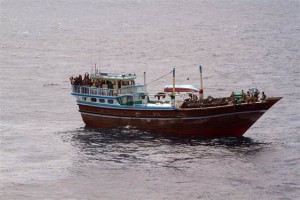Special to WorldTribune.com
WASHINGTON — Despite a sharp drop in the success rate, hundreds of
Somalis continue to engage in piracy in the Red Sea and Gulf.
A senior U.S. official said hundreds of Somalis continue to be employed
as pirates and target merchant vessels in the Red Sea and Gulf of Aden.
Thomas Kelly, principal deputy assistant secretary, said the pirates were
believed financed by international figures.

“One of the critical elements of the structure of pirates, of course, is
that these groups are kind of supported by organizers and financiers,” Kelly said. “And there we’re talking probably about a few dozen individuals. And one of the key elements of our strategy is to try to break those networks by going after the heads of the organization. And that’s going to take a lot of international cooperation, kind of financial forensic work.”
In a briefing on April 20, Kelly said the United States has assessed
that the number of “active pirates” was in the “high hundreds.” He said virtually all of the pirates stemmed from clans in Somalia, who now hold nine ships and 225 crew members.
“Since these pirate networks seem to be organized around kind of clan and communal groups, they tend to go with their own people,” Kelly said. “We think that the pirate networks are dominated by certain clans in a few concentrated regions of Somalia.”
Officials said the rate of successful piracy operations dropped by 50
percent over the last year. They attributed the decline to an international
counter-piracy task force that patrols both the Red Sea and the Gulf.
Washington and its allies have also ordered U.S.-flagged merchant
vessels to introduce protection measures to repel pirates. The measures
included armed guards, known as privately contracted arms security
personnel, or PCASP.
“To date, not a single ship using PCASP has been successfully pirated,”
Kelly said. “The United States encourages flag states to allow PCASP as a
proven measure to repel pirate attacks.”
The United States has also helped establish prisons for pirates in
northern Somalia. In March 2012, the Seychelles transferred 17 convicted
pirates to one such prison.
A major challenge, however, has been to identify the international
sponsors of piracy attacks. Officials said they included those who help
negotiate ransoms for the release of ships and crews.
“We’re also focused on identifying and apprehending the criminal
conspirators who lead, manage, and finance the pirate enterprise, with the
objective of bringing them to trial and disrupting pirate business
practices,” Kelly said. “Interpol’s new piracy database is already yielding
results. The United States has indicted and is prosecuting two alleged
Somali pirate negotiators.”
